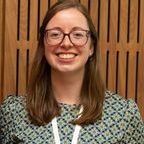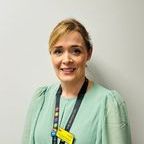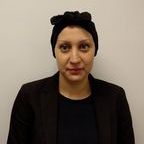Speakers

Niamh Horton

Carrie Chadwick

Khaja Syed

Phillip Monaghan

Sally Thirkettle

North West
Session Chair: Niamh Horton
3.45pm Carrie Chadwick and Khaja Syed, The Liverpool Neuroscience Biobank and The Walton Centre: Our journey so far
4.15pm Phillip Monaghan, The VALTIVE1 trial: Validation of plasma Tie2 as the first tumour vascular response biomarker for VE
4.30pm Sally Thirkettle, Validation of high-sensitive thyroglobulin and autoantibodies assays
4.45pm Beverly Hird, Fetal thyroid function
The North West session will focus upon recent innovation projects and specialist areas of Biochemistry from across the region.
The session will start with the specialist neurobiochemistry and neuroimmunology laboratory at The Walton Centre in Liverpool. The Neuroscience biobank manager Khaja Syed and Consultant Clinical Scientist and Laboratory Director Carrie Chadwick will discuss their experiences of developing a neuroscience biobank, how the process has been undertaken and the role of the biobank since its inception, including a focus upon external review and the accreditation process.
This will follow with talks from Consultant Clinical Scientist and Clinical Director of Pathology Dr Phillip Monaghan and Principal Clinical Scientist Dr Sally Thirkettle from The Christie Pathology partnership. The Christie Hospital is the largest single site cancer centre in Europe and the first UK centre to be accredited as a comprehensive cancer centre. Their talks will focus upon their specialist laboratory experience of cancer biomarker validation. Firstly, discussing the laboratory aspects of the VALTIVE1 trial, and the second talk will include discussion on the considerations for implementation of new biomarker assays for thyroid cancer monitoring.
Closing the session will be Director of Newborn Screening and Consultant Clinical Biochemist Beverly Hird from the Royal Manchester Children's Hospital, part of the Manchester University NHS Foundation Trust. The laboratory covers the newborn screening across Greater Manchester, Lancashire and South Cumbria and analyses approximately 60,000 samples per year. In addition to newborn blood spot screening, the department also provides a specialist endocrinology service. Beverly Hird will be giving an overview of fetal thyroid function and the talk will include discussion of a rare case of fetal gotire.
The Liverpool Neuroscience Biobank and The Walton Centre: Our journey so far - Carrie Chadwick and Khaja Syed
The Neuroscience Laboratories are part of The Walton Centre NHS Foundation Trust, a unique specialist neurology and neurosurgical Hospital providing care for a population of 3.5 million across the North West of England and North Wales. Neurobiochemistry, Neuroimmunology and Neuropathology services are provided by a team of twenty-one highly skilled staff.
We work as a cross discipline team to aid in the diagnosis of tumours and neurological conditions. We have established a neuroscience biobank –The Liverpool Neuroscience Biobank at The Walton Centre (LNBW), which supports translational research with local health partners. This presentation will describe our journey in establishing and developing the LNBW, including embedding biobanking processes into the patient pathway, building relationships with local health partners to enable translational research and being a pilot site for UKAS ISO20387 Biobanking Accreditation Program.
The VALTIVE1 trial: Validation of plasma Tie2 as the first tumour vascular response biomarker for VE - Phillip Monaghan
Universally, ovarian cancer is the seventh most frequently diagnosed cancer in women with a global 5-year survival rate of 30-40%. Currently, ovarian cancer patients are treated using bevacizumab, an anti-angiogenic therapy that targets tumour vasculature. Bevacizumab binds to circulating VEGF, inhibiting angiogenesis through the VEGFR signalling pathway which results in down regulation of biomarker - Tunica internal endothelial cell kinase 2 (Tie2); a tyrosine protein kinase receptor that plays a crucial role in angiogenesis.
There is a global need to develop biomarkers for VEGF inhibitors (VEGFi) to optimise their cost-effectiveness while minimising toxicity. Plasma Tie2 has been identified as a potential biomarker which can be monitored to optimise efficacy of treatment. Measuring circulating Tie2 concentrations in plasma can help ascertain patients in whom bevacizumab is an effective treatment and help predict progression free survival. In cases where bevacizumab proves to be ineffective, treatment can be stopped to prevent toxicity and expense.
In patients with ovarian (OC), colorectal and biliary tract cancer, treated with cytotoxic agents and bevacizumab or cediranib, it has previously been shown that a 25% reduction in plasma Tie2 over 9 weeks of VEGFi defines a vascular response to VEGFi, which is associated with a HR for PD of 0.55.
Our aim for the VALTIVE trial portfolio is to complete the Cancer Research UK (CRUK) biomarker roadmap to support widespread deployment of plasma Tie2 for clinical decision making on VEGFi therapy.
Validation of high-sensitive thyroglobulin and autoantibodies assays - Sally Thirkettle
Thyroglobulin is produced by the follicular cells of the thyroid gland and is present in the serum of healthy individuals but can be elevated in a number of disorders including follicular thyroid carcinoma, and therefore has an important role in the monitoring of these patients following thyroidectomy. Commonly, measured thyroglobulin levels are below the limit of quantitation of the thyroglobulin assay, necessitating the use of thyrogen pre-measurement to stimulate any residual thyroid tissue. However, the development of new, high-sensitive assays, may remove this requirement. This presentation will review verification data of such assays and discuss the considerations required for implementation.
Fetal thyroid function - Beverly Hird
In the fetus, thyroid hormones are essential for normal neurological development and growth, regardless of the source. Thyroid hormone production by the fetal thyroid begins at about 10 weeks gestation and concentrations of thyroxine and triiodothyronine gradually increase during the second and third trimesters. Adequate maternal supply of thyroxine is required during early gestation for all developing fetuses but remains crucial in the second and third trimesters for those with thyroid hormone biosynthetic defects or thyroid gland dysgenesis. Treatment of maternal thyroid disorders should be optimised, and severe iodine deficiency avoided, for the best outcomes. I will discuss a case of fetal goitre, considering the differential diagnosis, risks to the fetus and the input of laboratory medicine.